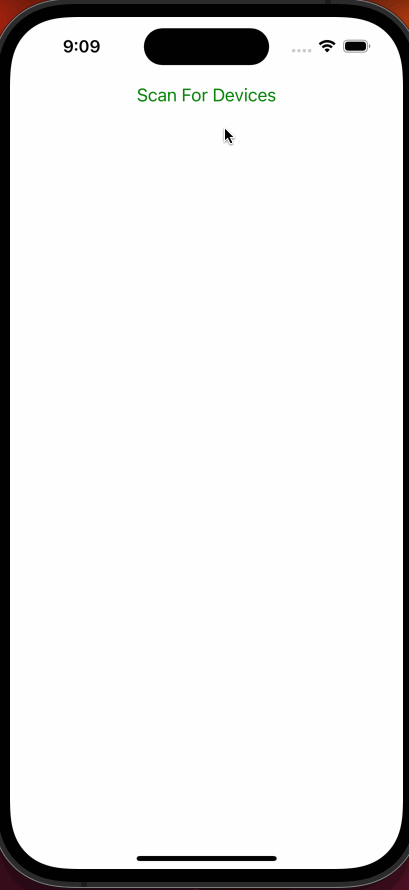Flir SDK module for React Native
yarn add react-native-flirnpm install react-native-flirnpx pod-install- Update
minSdkVersionto28insideandroid/build.gradlefile.
buildscript {
ext {
minSdkVersion = 28
}
}- Update
packagingOptionsinsideandroid/app/build.gradlefile.
android {
packagingOptions {
pickFirst 'lib/**/*.so'
}
}- Update the
ios/{FlirPoject}/Info.plistfile.
<dict>
...
<key>UISupportedExternalAccessoryProtocols</key>
<array>
<string>com.flir.rosebud.fileio</string>
<string>com.flir.rosebud.config</string>
<string>com.flir.rosebud.frame</string>
</array>
</dict>import React, { useState } from 'react';
import { Dimensions, View, Button, SafeAreaView } from 'react-native';
import { useFlir, FlirCameraView } from 'react-native-flir';
const useStream = () => {
const [streaming, setStreaming] = useState(false);
return {
active: streaming,
start: () => setStreaming(true),
stop: () => setStreaming(false),
};
};
const useThermal = () => {
const [thermal, setThermal] = useState(false);
return {
active: thermal,
enable: () => setThermal(true),
disable: () => setThermal(false),
};
};
const { width, height } = Dimensions.get('window');
const App = () => {
const {
scanning,
connected,
streaming,
device,
start,
stop,
connect,
disconnect,
} = useFlir();
const stream = useStream();
const thermal = useThermal();
return (
<SafeAreaView style={{ flex: 1 }}>
{!streaming && !connected && !scanning && (
<Button title="Scan For Devices" onPress={start} color={'green'} />
)}
{!streaming && !connected && scanning && (
<Button
title="Stop Scanning For Devices"
onPress={stop}
color={'red'}
/>
)}
{!streaming && !connected && scanning && device && (
<Button title={`Connect ${device}`} onPress={connect} color={'green'} />
)}
{!streaming && connected && (
<Button
title={`Disconnect ${device}`}
onPress={disconnect}
color={'red'}
/>
)}
{!streaming && connected && (
<Button
title="Start Streaming"
onPress={stream.start}
color={'green'}
/>
)}
{streaming && connected && (
<Button title="Stop Streaming" onPress={stream.stop} color={'red'} />
)}
{streaming && connected && (
<Button
title={thermal.active ? 'Disable Thermal' : 'Enable Thermal'}
onPress={thermal.active ? thermal.disable : thermal.enable}
color={thermal.active ? 'red' : 'green'}
/>
)}
<View style={{ opacity: streaming ? 1 : 0 }}>
<FlirCameraView
stream={stream.active}
thermal={thermal.active}
width={width}
height={height / 1.5}
/>
</View>
</SafeAreaView>
);
};| Example Android Flir Demo | Example IOS Flir Demo |
|---|---|
 |
 |
interface FlirCameraViewProps {
//
// Indicates if the camera view should stream data from the device.
stream: boolean;
//
// Indicates if the camera view should display thermal data.
thermal: boolean;
//
// The width of the camera view.
width: number;
//
// The height of the camera view.
height: number;
}interface Flir {
//
// Indicates if the module is currently scanning for devices.
scanning: boolean;
//
// Indicates if the module is currently connected to a device.
connected: boolean;
//
// Indicates if the module is currently streaming data from a device.
streaming: boolean;
//
// Returns the frame rate of the active stream.
fps: number;
//
// Connects the module to the detected device from the scan.
connect: () => void;
//
// Disconnects the module from the connected device.
disconnect: () => void;
//
// Starts scanning for devices.
start: () => void;
//
// Stops scanning for devices.
stop: () => void;
//
// Invokes callback with the device identifier when a device is found.
onDeviceFound: (callback: (device: string) => void) => EmitterSubscription;
//
// Invokes callback with the device identifier when a device is lost.
onDeviceLost: (callback: (device: string) => void) => EmitterSubscription;
//
// Invokes callback with the error message when a device scan error occurs.
onDeviceScanError: (callback: (error: string) => void) => EmitterSubscription;
//
// Invokes callback with the device identifier when a device is connected.
onDeviceConnected: (callback: (device: string) => void) => EmitterSubscription;
//
// Invokes callback with the device identifier when a device is disconnected.
onDeviceDisconnected: (callback: (device: string) => void) => EmitterSubscription;interface UseFlir extends Flir {
// Returns the device identifier of the connected device.
device: string;
}- Install the dependencies:
yarn - Start the packager:
yarn example start - Build the native application:
yarn example androidoryarn example ios
See the contributing guide to learn how to contribute to the repository and the development workflow.
MIT
Made with create-react-native-library